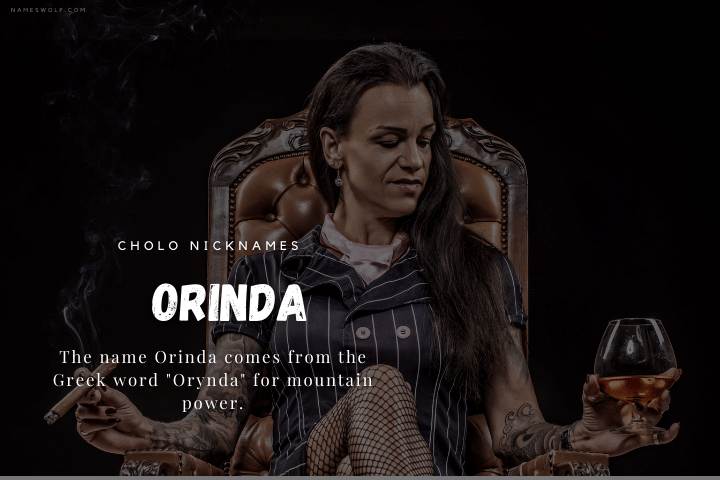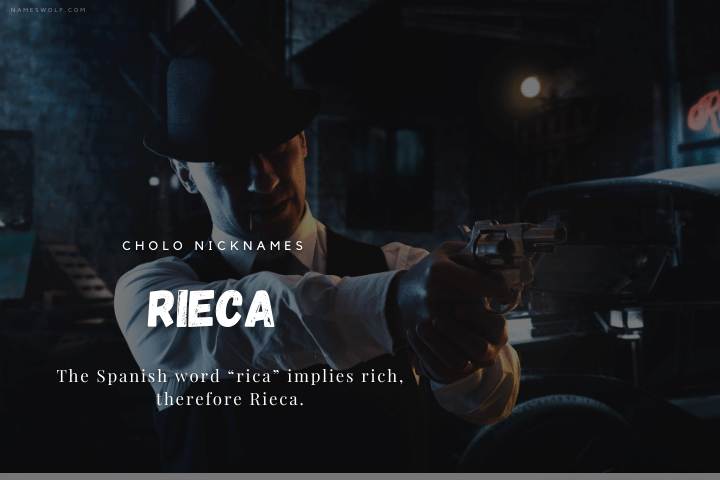Cholo nicknames have become an integral part of Chicano culture, serving as both a source of pride and a way to establish street credibility.
These nicknames often reflect aspects of a person’s personality, neighbourhood, or even physical appearance. While some may see these names as derogatory or intimidating, they are actually a testament to the creativity and resilience of the community.
What makes cholo nicknames unique is their ability to capture the essence of an individual in just a few words. They can be humorous, clever, or even poetic, serving as social currency among friends and rival gang members alike.
Cholo Nicknames
Dive into the vibrant universe of Cholo Nicknames – get ready to be amazed by the creativity and significance behind these captivating street names. Don’t miss out!
- Generys: The moniker Generys comes from the Spanish word “generoso”: generous.
- Mireia: Mireia comes from the Spanish word for miraculous, “mireya”.
- Felita: The Spanish term “felicidad” signifies happiness, therefore Felita.
- Neina: The name Neina comes from the Spanish word “niña” meaning girl.
- Salomon: The Spanish word “salomón” implies peace, therefore Salomon.
- Amata: The Spanish word “amada” means adored, therefore Amata.
- Remedios: Its name comes from the Spanish word for medicines, remedios.
- Digna: Digna comes from the Spanish word for worthy, “digna”.
- Ysabelle: Ysabelle comes from the Spanish word “isabel,” meaning committed to God.
- Rieca: The Spanish word “rica” implies rich, therefore Rieca.
- Abelardo: The Spanish word “abelardo” implies noble and eager, therefore Abelardo.
- Mema: Mema comes from the Spanish word for godmother, “miemma”.
- Fidelis: Fidelis comes from the Latin word for faithful.
- Prestha: Presta comes from the Sanskrit word for cherished, prestha.
- Salvatore: The Latin word “salvator” signifies saviour, therefore Salvatore.
- Camellia: The name Camellia comes from the Greek word “kamýlos” meaning perfect.
- Preciosa: Preciosa comes from the Spanish word “precioso”: precious.
- Ilma: Ilma comes from the Spanish word “iluminada”: enlightened.
- Guinan: Guinan comes from the Spanish word “guinando” for singing.
- Oswaldo: Germanic “Oswald” denotes God’s power, therefore Oswaldo
- Casta
- Anita
- Dabora
- Pablo
- Larena
- Graziella
- Manuel
- Nalda
- Luzetta
- Fermin
- Bricia
- Castanea
- Dalary
- Celestino
- Rio
- Veeda
- Alejo
- Renato
- Sofia
- Rayen
- Benjamin
- Eloi
- Corazon
- Clarita
- Jerardo
- Arsi
Cholo Nicknames for guys
Elevate your street cred with these awesome Cholo Nicknames for guys. Unleash your inner gangster and make a statement with your moniker.
- Mer: Mer comes from the Hebrew word “mer” for light.
- Eustaquio: The Greek word “Eustachios” signifies bountiful, therefore Eustaquio.
- Pila: The Latin word “pila” implies ball, hence Pila.
- Alarico: Alarico comes from the Germanic word “Alaric” for all-powerful lord.
- Ines: The Greek word “Hagne” implies pure, therefore Ines.
- Amelinda: The Latin words “amare” and “linda” indicate to love and be lovely, respectively, therefore Amelinda.
- Blanca: The Spanish word “blanco” signifies white, therefore Blanca.
- Milagra: The Spanish term “milagro” implies miraculous, therefore Milagra.

- Chara: The Greek word “Charis” signifies grace, therefore Chara.
- Peni: The Hawaiian word “peni” signifies butterfly, hence Peni.
- Adalira: Adalira comes from the aristocratic Germanic name “Adal”.
- Cari: Welsh “Carwyn” means cherished, hence Cari.
- Jereza: Hebrew “Yerushalayim” denotes Jerusalem, therefore Jereza.
- Oro: The Spanish word “oro” implies gold, therefore Oro.
- Olyff: The Old English term “Oleofe” signifies olive branch, therefore Olyff.
- Aquilino: The Latin word “Aquila” signifies eagle, therefore Aquilino.
- Chiquita: The Spanish term “chiquito” implies little, hence Chiquita.
- Marvelle: Marvelle comes from “merveille”: French for wonder.
- Santos: Santos comes from the Spanish word for saint, “santos”.
- Ekisa: The Swahili word “ekisa” signifies laughter.
- Andris: Andris comes from the Latvian word “andris” meaning manly.
- Ofelia: Ofelia comes from “ophelos”: help in Greek.
- Pureza: The name Pureza comes from the Spanish word “pureza” for purity.
- Haswar: The Arabic word “hasw” implies joy, therefore Haswar.
- Dores: The name Dores comes from the Portuguese word “dores” for sadness.
- Danna: The Hebrew word “danna” signifies judge, hence Danna.
- Freira: Freira comes from the Portuguese word for nun, “freira”.
- Vinita: Vinita comes from the Sanskrit word for modesty, “vinita”.
- Carmilla: The Latin word “carmilla” signifies song, hence Carmilla.
- Luminosa: The Spanish word “luminoso” signifies bright, therefore Luminosa.
- Pura
- Gredlan
- Agapito
- Chavez
- Andreo
- Leah
- Faustina
- Angelia
- Leocadio
- Chifla Culas
- Lidia
- Grecia
- Tullia
- Inesa
- Cumma
- Florida
- Rilla
- Rosalina
- Oihane
- Lonzo
- Antonella
- Refugio
- Chana
- Marcelo
- Carmin
- Nieva
- Servando
Cool Cholo Nicknames
Looking for a badass nickname? Explore our collection of cool cholo monikers that will give you instant street cred.
- Terry: Terry comes from the Old French word “tirel”: ruler.
- Nacho: Nacho comes from “ignacio”: fierce in Spanish.
- Jovanny: The Hebrew word “yovany” means God’s gift, therefore Jovanny.
- Baila: The Hebrew word “bailah” signifies dancing, therefore Baila.
- Alvaro: Alvaro comes from the Germanic word “alvar” for elf army.
- Amaranta: The Greek term “amarantos” signifies unfading, hence Amaranta.
- Balea: The Latin word “balia” signifies strength, therefore Balea.
- Martina: Latin “martius” means “dedicated to Mars” in Martina.
- Ismael: The Hebrew term “yishma’el” implies God will hear, therefore Ismael.
- Elvera: Germanic “albhera” implies noble and shining, therefore Elvera.

- Teresa: Teresa comes from the Greek word “theresia” for harvest.
- Santana: The Spanish word “santana” signifies saintly.
- Frisco: Frisco comes from the Latin word for curly hair, “Frisco”.
- Melia: The name Melia comes from the Greek word “Melia” for honey-sweet.
- Elodia: The Greek word “Helodia” means marsh flower, therefore Elodia.
- Nita: In Latin, “Nitare” means to shine, hence Nita.
- Estmar: Estmar comes from the Germanic words “est” (strong) and “mar” (fame).
- Clarisa: The Latin word “Clara” implies brilliant and clear, therefore Clarisa.
- Orinda: The name Orinda comes from the Greek word “Orynda” for mountain power.
- Damia: In Greek, “Demeter” means “harvest goddess”.
- Caballo
- Rana
- Gringo Loco
- Charrito
- Donny
- Adolfito Chapulin
- Playboy
- Enmascarado
- Charro Negro
- Perla
- Gallo Gordo
- Bahia
- Carmen
- Maximiliano
- Madina
- Min
- Elena
- Natividad
- Adrian
- Heufemia
- Moa
- Fernanda
- La Tiny
- Gina
- Rosaline
- Oca
Also Check: 550+ Goth Usernames That Reflects Your Personal Style
Cute Cholo Nicknames
Looking for cute cholo nicknames? Look no further! Find the sweetest and most endearing names to express your affection.
- Azahara: The Arabic word “Azhar” means flower, therefore Azahara.
- Augusto: The Latin word “Augustus” signifies great and venerable, therefore Augusto.
- Jolanta: Jolanta comes from the Slavic word for violet, “Jolenta”.
- Bandana: Bandana comes from the Sanskrit word “Bandhana” meaning to tie or bind.
- Placida: The Latin term “Placidus” indicates peaceful or tranquil, therefore Placida.
- Hector: Hector comes from the Greek term “Hektor”: spearholder.
- Ernesta: Ernesta comes from the Germanic word “Ernest” meaning earnest or determined.
- Lorah: The Hebrew word “Lorach” signifies crown of laurel, therefore Lorah.
- Elazar: The Hebrew term “Eleazar” means God has aided, therefore Elazar.
- Rodolfo: Germanic “Hrodulf” means famed wolf, thus Rodolfo.
- Mercedes: Mercedes comes from the Spanish word “Merced” for kindness.
- Toiya: The name Toiya comes from the Japanese word “Tōyō” meaning abundance.
- Enricua: The Latin term “Enricus” implies powerful king, therefore Enricua.
- Francisca: The Latin term “Franciscus” implies free man, therefore Francisca.
- Emilia: Emilia comes from “Aemilia”: striving or ardent in Latin.
- Julietta: Julietta comes from the French word “Juliette” meaning youth.
- Landrada: Landrada comes from the Germanic term “Land Rath” for land council.
- Mitzi: Mitzi comes from the German term for sea star, “Mitzi”.
- Alwar: The name Alwar comes from the Old English word “Ælfwaru” meaning elf guard.
- Consolation: The Latin term “Consolatio” signifies comfort, therefore Consolation.
- Jaxx
- Señora Nariz Roja
- Valentine
- Renata
- Kristian
- Jesiah
- Bigotes
- Brecken
- Xantina
- Adler
- Jovanni
- Blanco
- Carnal
- Primoroso
- Big Daddy Tuna
- Patrón
- Papacitos
- Monchis
- Don Muchacho
- 2Compa
- Niña
- Gallito
- Senor Locura
- Viejo
- Beto
- Huevito
- Burrito Grande
- Chaparra
- Perico
- Sanchez
- Pachuco Kid
Unique Cholo Nicknames
Uncover a world of one-of-a-kind Cholo nicknames that reflect your individuality and personality. Explore our collection now!
- Elsi: The Finnish word “Elsa” implies noble, therefore Elsi.
- Valentino: The Latin term “Valentinus” indicates strong and healthy, hence Valentino.
- Estevan: The Greek word “Stephanos” implies crown, therefore Estevan.
- Avyaan: Its name comes from the Sanskrit word for sun, “Avyaan”.

- Azriel: The Hebrew term “Azriel” means God is my support, therefore Azriel.
- Mariste: The name Mariste comes from the Latin word “Maristella” for sea.
- Marko: The Latin word “Marcus” signifies warlike, therefore Marko.
- Kyng: Kyng comes from Old English “Cyning”: king.
- Brayan: Brayan comes from the Celtic word “Brayden” for valiant.
- Tijeras: Tijeras comes from the Spanish word for scissors, “Tijeras”.
- Tajo
- Cheche
- Everest
- Jones
- Harley
- Sagrario
- Concha
- Gary
- Truett
- Zechariah
- Montenegro
- Emmanuel
- Leroy
- Aries
- Gordon
- Jesenia
- Lucas
- Yahir
- Joey
- Goofy Gangster
- Sevilla
- Catalyn
- Braden
- Randy
- Little Churro Man
- Ceron
- Reinette
- Kelvin
How to find a good Cholo Nickname?
Cholo culture values nicknames as symbols of originality, personality, and street reputation. A decent Cholo moniker takes imagination and thought.
- Inspiration might come from personal experiences or traits that define you. If you’re brave when tackling obstacles, you could be called El Valiente (The Brave). This honors your bravery and inspires community respect.
- Paying tribute to your origin or culture is another technique to find a suitable Cholo nickname. Your name can be more real and meaningful by using Spanish words or phrases. If you have significant connections in Mexico City, adding its urban setting into your nickname might make it genuinely unique and important. El Caminante del Asfalto (The Asphalt Wanderer) symbolizes resilience and flexibility while embracing Mexican history.
- Remember that finding a decent Cholo nickname is about reflecting yourself in the Cholo culture, not merely picking cool terms. By drawing inspiration from personal experiences or ideals and honoring your history, you may design a nickname that stands out and means something to you and the community. Let your imagination run wild and embrace the power of a good Cholo moniker!
FAQs
1. What are Cholo Nicknames?
Cholo nicknames are creative and often humorous monikers used within the Cholo subculture to identify individuals or groups.
2. How are Cholo Nicknames created?
Cholo nicknames are typically created by combining elements like a person’s name, physical characteristics, personality traits, or even their favorite things.
3. Are Cholo Nicknames offensive?
Cholo nicknames are not inherently offensive as they are embraced and used proudly within the Cholo community. However, it’s important to recognize that context and intent play a role in determining whether something is offensive to an individual.
4. Can anyone have a Cholo Nickname?
While anyone can have a nickname, Cholo nicknames specifically reflect the cultural identity of individuals involved in the Cholo subculture.
5. Are there any rules for creating a Cholo Nickname?
There are no set rules for creating cholo nicknames; they can be as creative and unique as you want them to be!
Conclusion
Cholo nicknames are deeply rooted in the subculture of Chicano gangs and have evolved over time to become a form of identity and self-expression for those involved. While some may argue that these nicknames perpetuate negative stereotypes, it is important to understand the cultural significance and historical context behind them.
